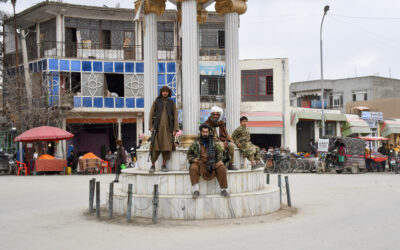
The Long Arm of China’s Security Services
SUBSCRIBER+ EXCLUSIVE REPORTING — When Chinese President Xi Jinping came to San Francisco last November to meet with President Joe Biden, Chinese pro-democracy activists in […] More
An old boss of mine at the CIA used to talk to young officers who were deploying to Afghanistan or Pakistan, and in his preamble to discussing the myriad of challenges and interests in the region, he would remark that if the officer were a thoroughbred, an assignment to the area was going to be like running in the Kentucky Derby every damn day—and so it was.
The story comes to mind in that today we see a sort of Kentucky Derby in Afghanistan, where there are a lot of horses running, everyone is out for themselves, no one is working together for the common good, and certainly no one is rooting for one of the other horses to win. Between FSB, ISI, CIA, RAW, and the IRGC, the field is thick with competition and a lot of “horses” jockeying for position among the various intelligence services.
When asked last month by a reporter about the possibility that Russia was supplying arms to the Taliban and other rebel groups, General John Nicholson, the Commander of U.S. forces in Afghanistan, confirmed that yes, this was happening, and then in a classic case of diplomatic understatement, he deadpanned that “arming belligerents… is not the best way forward to a peaceful reconciliation…” But does General Nicholson or anyone else actually think the Russians would like to see the U.S. achieve any modicum of success in Afghanistan?
Russia today, or at least the Russia under the leadership of former KBG careerist turned politician, Vladimir Putin, sees the world as a stark zero-sum game where anything good for the U.S. must be bad for Russia, and anything bad for the U.S. must be good for Russia. In that simple construct, when you ask if Russia is meddling in Afghanistan and working counter to U.S. objective’s in the region, the answer is, of course they are. Remember also that when the Russians invaded Afghanistan in December 1979, the U.S. joined forces with Ahmed Shah Massoud and other mujahideen and conducted a brutal covert action campaign against the Russians that killed thousands of Russian soldiers, leading to a stinging defeat of the once great Soviet Army that was forced to leave Afghanistan ten years later, in 1989. So, no, the Russians do not wish us well in Afghanistan.
That brings us to Pakistan’s much-maligned Inter Services Intelligence (ISI) who are long credited with destabilizing activities in Afghanistan, and this is not a claim without some basis in reality. But I also find hard to accept the oft-repeated Afghanistan narrative that the evil Pakistani’s are responsible for the violence and instability in Afghanistan, and if ISI would just stop making mischief, then Afghanistan would be like Switzerland. This narrative tends to put all the blame for Afghanistan’s failures on Pakistan. It is easier, it seems, to just blame your neighbor for your problems, but it overlooks Afghanistan’s own issues with poor leadership and endemic corruption, putting all the blame on their bad neighbor.
The reality is actually more complicated, and Pakistan suffers on their own from the same set of challenges that challenge Afghanistan: Bad economies, bad governance, a weak central government with little reach into the countryside, and a cornucopia of issues with ethnic, tribal, and sectarian violence that threaten to rip apart both of their countries. But, for sure, Pakistan has often disappointed, because we always think they could be a very effective force for good in the region—if only they would try.
That brings us to the formidable intelligence service of India, the Research and Analysis Wing (RAW) and their arch enemy, the ISI of Pakistan. Of all the classic rivalries in the world, from the Hatfield’s and McCoy’s, to the Ney York Yankees and Boston Red Sox, the rivalry between the intelligence services of India and Pakistan make every other rivalry in the world pale in comparison. No one has the passion or the enmity for their rival as does RAW and ISI.
With regard to Afghanistan, ISI is concerned that India will be able to establish a close relationship with Afghanistan, and then an Afghanistan/India alliance would present Pakistan with challenges and effectively another front in their long simmering war with India. The Indians, on the other hand, don’t want to see Pakistan extend their regional footprint through a strong relationship with Afghanistan.
Sure, the dynamics of that India-Pakistan clash in Afghanistan doesn’t make sense to most pundits in the West, but you have to remember that these same two countries have been fighting battles over the Siachen Glacier for decades in a conflict one of my friends derisively mused was like, “two bald men fighting over a comb…”
And now Iran enters the fray? A New York Times headline last week blared, “Iran Gains Ground in Afghanistan as US Presence Wanes.” Again, Iran is a player on the world stage who does not want to see the U.S. succeed, and we are on the opposite sides of conflicts in Syria, Yemen, Iraq and elsewhere, so to be on opposite sides in Afghanistan should come as a surprise to no one.
And so it goes in Afghanistan: The Kentucky Derby of spying, where the stakes are high, and where none of the horses are working together toward a common cause.
Related Articles

SUBSCRIBER+ EXCLUSIVE REPORTING — When Chinese President Xi Jinping came to San Francisco last November to meet with President Joe Biden, Chinese pro-democracy activists in […] More

SUBSCRIBER+EXCLUSIVE EXPERT PERSPECTIVE — More than two years after its withdrawal from Afghanistan, the U.S. still does not have a clear way forward in the […] More

SUBSCRIBER+ EXCLUSIVE REPORTING — Ukrainians greeted Saturday’s long-awaited House passage of $60.8 billion in aid with justifiable jubilation. For months, their soldiers, civilians, and political […] More

SUBSCRIBER+ EXCLUSIVE REPORTING — A race for control of space is underway, and just as on earth, the U.S. and China are the top competitors. […] More

SUBSCRIBER+ EXCLUSIVE REPORTING — For nearly a week, the Middle East and much of the world were on a knife’s edge, waiting for a promised […] More

BOTTOM LINE UP FRONT – Less than one week after Iran’s attack against Israel, Israel struck Iran early on Friday, hitting a military air base […] More
Search